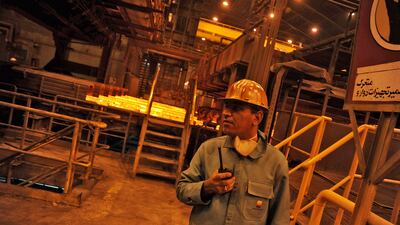Iranian industry was again hit by cyber attacks on Monday, part of what Tehran says is a continuing campaign of sabotage to weaken the country’s industrial capacity before the possible revival of a nuclear deal struck in 2015.
The Khuzestan Steel Company shut down operations “until further notice”, citing technical problems after a cyber attack.
Such attacks can damage computers and disrupt software that controls vital operations, in severe cases leading to accidents, fire or even exploding equipment.
Iran claims that government-backed Israeli or US hackers are behind a recent sabotage campaign, although some analysts say exiled Iranian opposition groups could be responsible.
The continuing campaign of disruption might have spurred Iranian counter-attacks — in early 2020, Israel said an Iranian cyber attack had affected operations at a water treatment plant and last month said Iran might have been behind an attack that triggered rocket-attack alarms.
Israel is suspected of a series of sabotage operations against Iranian industry linked to the country’s nuclear programme and is widely believed to be behind a campaign of assassinations of Iranian nuclear scientists.
Iran disconnected much of its government infrastructure from the internet after the Stuxnet computer virus — widely believed to be a joint US-Israeli creation — disrupted thousands of Iranian centrifuges in the country’s nuclear sites in the late 2000s.
Talks to revive a nuclear agreement struck in 2015, known as the Joint Comprehensive Plan of Action, are set to resume soon.
Israel has pledged to halt Iran’s atomic programme if the international community fails to do so, and is concerned that a revival of the deal between Iran and world powers — under which UN inspections of nuclear sites would resume in exchange for the easing of sanctions — could lead to Iran obtaining a nuclear weapon.
But negotiations have faltered, with the International Atomic Energy Agency accusing Iran of hiding information on its nuclear programme.
Last month, Israeli Prime Minister Naftali Bennett said his country “reserves the right to self-defence and to take action against Iran to block its nuclear programme should the international community not succeed in the relevant time frame”.
Iran reiterated on Monday that it was up to the US to remove remaining obstacles to a new deal.
Steelwork operations disrupted
Amin Ebrahimi, chief of the state-owned steel company, said the latest cyber attack was stopped before it could damage production lines that would affect supply chains and customers.
“Fortunately with time and awareness, the attack was unsuccessful,” the semi-official Mehr news agency quoted Mr Ebrahimi as saying. He expected the company's website to be restored and everything to return to "normal" by the end of Monday, it said.
Local news channel Jamaran reported that the attack had failed because the factory happened to be non-operational at the time due to a power cut.
The company did not blame any specific group for the latest assault. In a major incident last year, a cyber attack on Iran's fuel distribution paralysed petrol stations across the country, leading to long queues of angry motorists.
Train stations in Iran have also been hit by fake delay messages. Surveillance cameras in the country and state-run websites have been hacked. Footage allegedly showing abuse in the country's notorious Evin prison has been leaked.
Khuzestan Steel Company, based in Ahvaz in the oil-rich, south-western Khuzestan province, has a monopoly on steel production in Iran along with two other major state-owned companies.
Founded before Iran's 1979 revolution, the company for decades had some production lines supplied by German, Italian and Japanese companies.
However, crushing sanctions imposed on Iran over its nuclear programme forced the company to reduce its dependence on foreign parts.
The government considers steel a crucial sector. Iran is the leading producer in the Middle East and among the top 10 in the world, the World Steel Association says.
Iran's crude steel production, however, amounted to only 2.3 million tonnes last month, the WSA said. Its drop in exports has been attributed largely to Russia flooding Iran's Chinese buyers with discounted steel after losing access to western markets due to the war on Ukraine.









